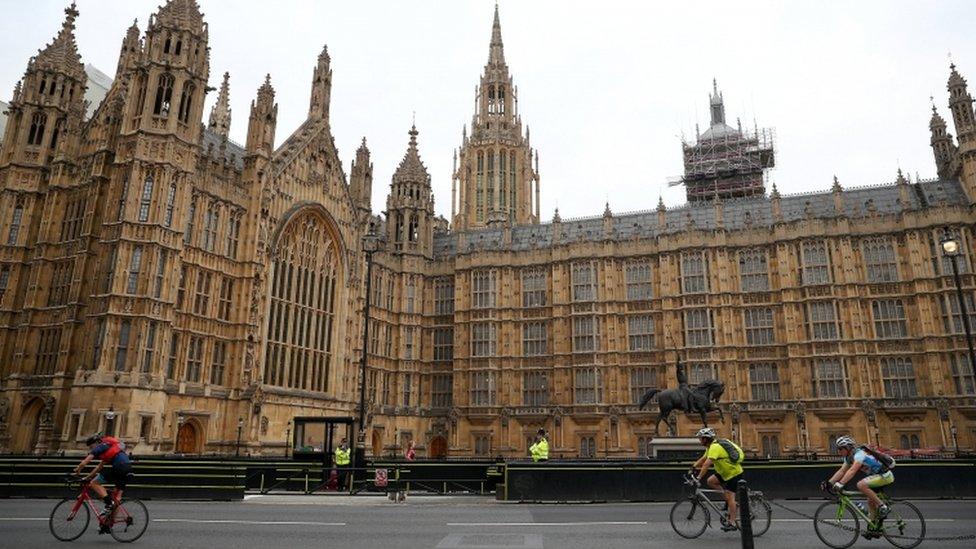What are the limits to parliamentary free speech?
- Published
Lord Hain said the details were "clearly in the public interest"
When the Labour peer, Lord Hain, used parliamentary privilege to name Sir Philip Green as the businessman at the centre of a legal action about harassment, did he open a parliamentary Pandora's Box?
The ancient right of parliamentary privilege gives MPs and peers unrestricted free speech in their debating chambers - this enables them to name names without any fear of being dragged before the courts and sued for defamation.
It is, potentially, a powerful tool for righting wrongs, but, as they say in teen epics, with great power, comes great responsibility.
And there are some in Westminster who now fear an epidemic of social media-driven injunction busting in Parliament.
This week, I attended a meeting convened by a newish think-tank, the Bingham Centre for the Rule of Law, external, where an audience mostly composed of senior lawyers, judges and constitutional scholars, thought Lord Hain's actions an outrage.
"It cannot be right," thundered superlawyer Lord Pannick, that any parliamentarian could simply set aside the rulings of a court and name a name that it had ordered should not be disclosed.
Worse still, it might reveal details of a live court case, so breaking both the injunction and the sub judice rule, under which parliamentarians do not discuss actions before the courts.
Rare events
So should this right be curtailed in some way?
The first point to make is that these events are fairly rare. The last few years have seen a handful of cases, mostly involving the former Lib Dem MP, John Hemming, who in March 2011, used parliamentary privilege to reveal the existence of a super-injunction granted to former Royal Bank of Scotland chief Fred Goodwin and later mentioned Ryan Giggs as the footballer whose name was protected by another injunction.
The clerks of the Commons and Lords are kept aware of live court cases, so that they can alert the chair to prevent breaches - sometimes they will be forewarned; perhaps the MP or peer concerned will have attempted to put down a question or an EDM and been blocked from doing so.

But if not, they have to react pretty rapidly, or the name will be uttered, and broadcast live on BBC Parliament, and thence released into the wilds of the twittersphere, in a matter of seconds.
This kind of thing could become a problem.
There have been legal challenges to the use of parliamentary privilege in the European Court of Human Rights, external, but the ECHR has thus far always upheld the right of freedom of speech within a parliament; but there is also the implication that if a parliament fails to police the actions of members effectively, then the court might begin to look at this differently.
Were Sir Philip to bring an action saying Lord Hain had infringed his right to a fair trial, under Article 6 of the European Declaration, the result would be a rather interesting case.
How, then, might the Commons and the Lords deal with MPs or peers set on breaking the terms of an injunction, to name some name?
The current rules advise against such actions unless the parliamentarian in question "thinks it right". This is not exactly a high bar. Peers are also supposed to act "on their honour".
One suggestion on toughening up this system, made at the Bingham Centre meeting, was that an MP or peer contemplating breaking an injunction should discuss the idea with the Speaker or Lord Speaker, and could be open to some kind of disciplinary action if they went against their advice.
They would then have the chance to justify their action, perhaps before a committee, or maybe even the whole House. And at the end of the process there would have to be the possibility of a significant sanction - including suspension or expulsion.
Whether MPs or peers would be prepared to accept such a restriction, and vote through the rule changes needed to underpin it, is another question.
